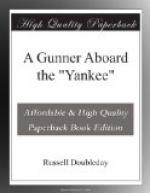IN GOD’S COUNTRY.
The “Yankee’s” stay in Key West was marked by one of the most melancholy incidents of the cruise. Thomas Clinton LeValley, one of the first of the New York Naval Reserves to respond to the call for volunteers, died from appendicitis in the hospital ashore, to which he had been removed for treatment. “Tom,” as he was familiarly called by his shipmates, was on board the “Yankee” during the five engagements of that vessel, and proved himself loyal and steadfast on every occasion. He was well liked by the officers and men of the crew, and his death was deeply regretted by all. It was his fate to be the one member of the New York Naval Reserves to lose his life in the service of his country.
When a big barge heaped high with coal came alongside and was made fast, we began to doubt the assurances given us, that the coal would be put in by outside labor. A tug hove in sight shortly afterward that caused our gloomy faces to light up with gladness, for it carried a gang of negroes. The tug made fast to the barge, and its living cargo was soon hard at work filling the ship’s bunkers.
All that afternoon we “lingered in the lap of luxury,” as “Bill” put it. At six o’clock our dusky (doubly dusky) coal heavers went ashore, their labor over for the day. Though the workmen had left, the work was still to continue. The crew coaled till twelve o’clock, working in quarter watches. The following day another barge came alongside and part of the crew had to turn to and help the hired shovellers.
“So much,” said “Stump,” snapping his fingers, “for the officers’ assurances.”
Up to this time we did not know where we were going. Of course the “Rumor Committee” were ready with news of destinations galore. We were to return to our patrol duty, to join the Flying Squadron and threaten the coast towns of Spain, to join the blockading squadron off Havana. We were to do a dozen or more things just as probable or just as improbable.
A coal barge still lay alongside the starboard side of the ship, when a lighter appeared and made fast to the port side, loaded with express packages, parts of machinery, pipes, and bags of mail for every ship on the Santiago blockade.
“Now we will get those eight bags of mail,” said a forecastle man, exultantly. And from that moment we knew we were going back to Cuba.
But like a good many people who think they know it all—we didn’t.
Bunkers, holds—almost every available space, in fact, was filled with coal.
Then began the much dreaded job of painting. Stages were hung over the side, each manned by two men, and with much reluctance we began to daub the old “Yankee” with gray paint.
The men were unaccustomed to such work, though some could handle the brushes sold in “artist’s materials” shops well enough, and they spattered gray paint all over themselves. It was thought easier to wash skins than jumpers, so many were decorated in wonderful fashion.




